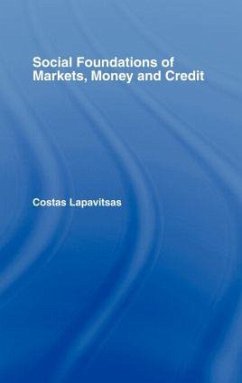Where does the power of money come from? Why is trust so important in financial operations? How does the swapping of gifts differ from the exchange of commodities? Where does self-interest stop and communal solidarity start in capitalist economies? These issues and many more are discussed in a rigorous, yet readable, manner in Social Foundations of Markets, Money and Credit. It is shown in particular that capitalist economies are permeated with non-economic characteristics. This carefully argued book will prove interesting and valuable to students and researchers not only in economics, but also in sociology and anthropology. Well-informed critics of capitalism will also find it a useful read.
Hinweis: Dieser Artikel kann nur an eine deutsche Lieferadresse ausgeliefert werden.
Hinweis: Dieser Artikel kann nur an eine deutsche Lieferadresse ausgeliefert werden.








